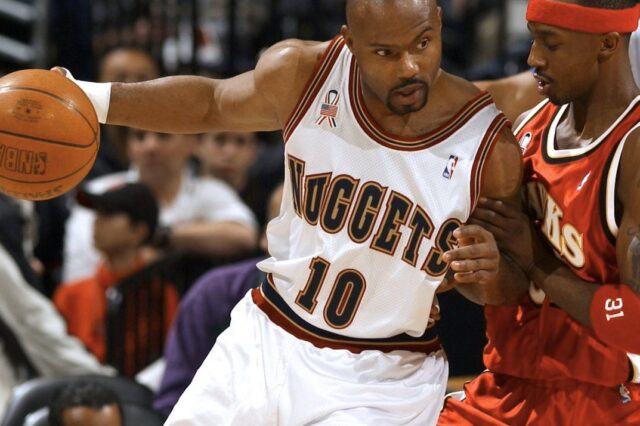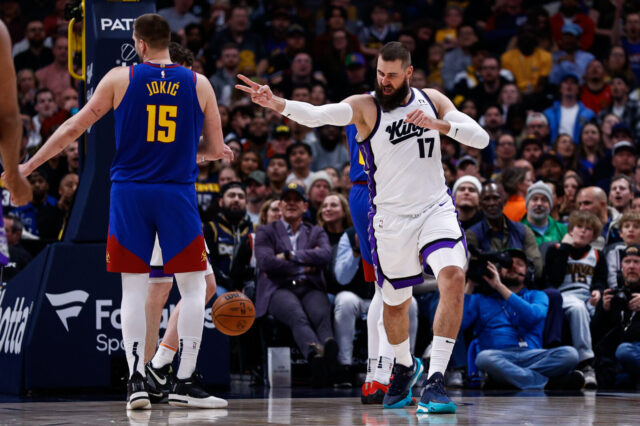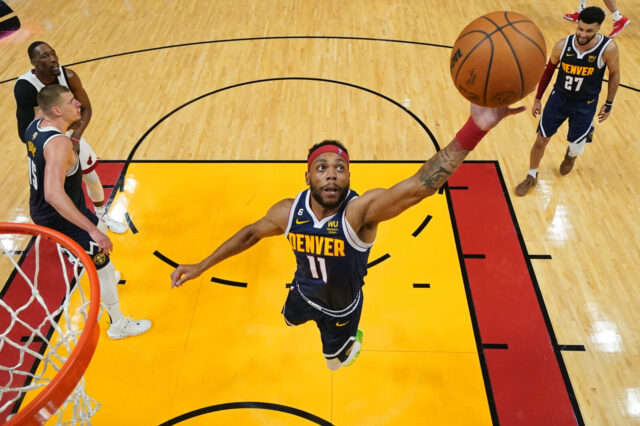If you’re not familiar with Film Fridays, each Friday, I’ll be looking at some recent Denver Nuggets’ games, lineups or something else from a film aspect to try and bring you a piece of content that you’re not getting somewhere else. Feel free to give any feedback positive or negative in the comments or find me on Twitter.
The Denver Nuggets’ season has been over for a little under two weeks which has allowed the wound to heal as we look towards next season. This Nuggets’ squad made it to the second round of the playoffs despite trotting out a roster depleted of the majority of their rotation-level guards against a Portland Trail Blazers’ squad that featured three different talented guards. Unfortunately for Denver, they were forced to follow up that first-round opponent with another talented group of guards in the Phoenix Suns. With Jamal Murray and others out of the lineup, Denver just didn’t have the firepower to keep up, but that is over and done with.
Enough about the bad stuff. Let’s look at the good stuff. How did the Nuggets get to the third seed in the Western Conference despite the presence of teams such as the Los Angeles Lakers and LA Clippers? Nikola Jokic won the MVP despite having the 12th-best odds entering the season. Despite their success over the last three seasons, Denver is consistently viewed as the little brother team that shouldn’t be taken seriously. Ultimately, I think they’re ok with that because it gives them a permanent chip on their shoulder to work with.
If Jokic was the favorite to win the MVP entering the season, would he have come in with the same level of conditioning and motivation that he played with all year. Prior to his injury, Murray was playing at a level that would have put him in consideration for a possible All-NBA nod. Along with the breakout we saw from Michael Porter Jr., this Nuggets’ team did some things this year that put the NBA on notice moving forward that this little brother is ready to come in and claim their seat at the table. How’d we get to this point?
MPJ is Close
During his first season of play with the Nuggets, MPJ was mostly a gunner. He attempted more 3-point shots in the playoffs than shots from 2-point range. In his second run, that stat was true once again with 73 attempts from downtown compared to 62 from inside the arc. Heading into Year 3, I think we’re going to see things balance out a little more. His touch inside the arc is smooth, and his ability to attack off the dribble makes this offense even more dangerous. Late in the season, in a matchup with the Clippers, this sequence takes place with Jokic off of the floor. Porter is the only legitimate offensive threat on the floor here, and the defense still has no chances. The back screen on Rajon Rondo throws him off, and he gets just inside the arc and puts up a floater. His jumper is better than his floater, but this shows off the finesse he improved on.
That floater is good, but plays like this are the ones that are really going to make the difference heading into his third year of play. If Porter can demonstrate the ability to drive and get to the rim, there wouldn’t be many NBA teams that could send out defenders that could match up with all three of Jokic, Murray and Porter. Porter sizes up his defender who is forced to guard him past the 3-point line because of Porter’s reputation as a shooter. Once he commits too hard, Porter drives through the defense to the rim for an easy layup. Porter will likely never be the ball-handler that someone like Kevin Durant is, but, if you can make plays like this more routinely with offseason dribbling work, he could make the Nuggets’ offense nearly impossible to slow down.
Skinny Jokic is Scary Jokic
We’ve all seen the image from an interview Jokic did earlier in his career. The second is an image from last Summer when he had slimmed down during the NBA’s pause prior to restarting in Orlando. The difference in physique was quite noticeable, and we saw all of that this season.
No one has played more minutes in the NBA, including the playoffs, over the last two seasons than Jokic. He averaged a career-high 34.6 minutes per game in the regular season this year along with a career-high usage rate of 29.6 percent. He held this high workload and number of minutes while still playing every single game this season. A major factor of that was his conditioning. Now, just imagine Jokic in the playoffs if the rest of the roster isn’t injured and forcing him to carry a heavier workload for longer. Scary right? Really quick, ask Jusuf Nurkic if he’d like to lose a couple of pounds before he has to play Jokic again. On this play from the final game of the regular season, Jokic just blew past him. Nurkic is one of the league’s better defensive centers, and he never even has a chance of stopping Jokic from scoring. The slimmed down Jokic maintained his power while gaining this burst that he held onto for the entire season.
Jokic was able to back opponents down super well because of his size and strength. So, when he lost the weight, one might assume that he would have to focus on playing with more finesse moving forward. Turns out, you would be assuming wrong. Jokic had no problem going into the post against anyone. On this play, he has Dario Saric guarding him down on the block. It doesn’t matter that Jokic was a little more slim because he just worked his way to the basket for the easy score. With his renewed speed and stamina, there just isn’t anything opponents will be able to do to slow him down without fouling him. Granted, it doesn’t matter because the fouls won’t get called anyway.
Find a Defensive Identity
In the two series against the Blazers and Suns, the Nuggets had some serious flaws exposed. One of them was on the offensive end where, if Porter wasn’t hitting shots, they had essentially no offense outside of Jokic. Another major factor was on the defensive end. They had some guys that would put in some effort here or there, but they don’t have an identity or a captain of the defense. Against the guards they played against, there was essentially no resistance. Against the bigs, Jokic was able to get Nurkic in foul trouble, but Deandre Ayton avoided them and averaged just 2.0 fouls per game. With Ayton avoiding fouls, he just wore Jokic down over the four games in the series. I’ve looked at the play above before, but it bothers me every time. You’re down six with just over 3:00 remaining, down 3-0 in the series, and your MVP center got ejected for one of the softest Flagrant 2 penalties I’ve seen in my lifetime. How do you respond? You let Chris Paul waltz to the rim for an easy layup. Will Barton doesn’t try to slide over, and Porter doesn’t rotate hard to help JaVale McGee who was screened. JaVale also doesn’t fight over the screen. The Suns had broken the Nuggets down repeatedly for the first 3.75 games of the series, but this play showed just how broken the Nuggets’ will was.
In the first half of Game 2 against Portland, Damian Lillard had 32 points on 9-of-15 shooting, including 8-of-11 from 3-point range. During the regular season, Denver had traded away two of their options to throw at Dame in Gary Harris and R.J. Hampton. Throw in the fact that P.J. Dozier and Will Barton, along with Murray, were still on the shelf, and your options to throw at Lillard were extremely limited. Michael Malone went with one of the few weapons they hadn’t tried by sending Aaron Gordon at him. Gordon’s size would keep Dame from bullying smaller guards. It wasn’t the ‘magic bullet’ that some folks claimed it to be, but, for at least one half of basketball, it worked pretty damn well. Lillard scored 10 points in the second half while shooting just 2-of-9 from the field. Nurkic slows Gordon down on the screen and gives Dame a good look at the basket, but Gordon keeps fighting. Dame was the only player keeping Portland in the game with his play during the first half, but Gordon didn’t let his will get broken and was ultimately rewarded for it. This is the type of identity Denver needs to find this offseason. If that means that they grab a player this offseason that wants to do nothing more than harass the opposing team’s best player for 40 minutes a night while scoring zero points, then so be it. Look at a guy like Matisse Thybulle with the Philadelphia 76ers. He needs to work on his offense, but, at the end of the day, his role is to be a defensive menace which he excels in to the tune of a +4.3 Defensive Box Plus/Minus. They may have that player on the roster already, but, regardless, they need to work on defense and be more than just a team with an elite offense because, on the nights when their offense isn’t clicking, their defense needs to carry the load.
For those of you that are still here, remember to leave your feedback in the comments or over on my Twitter, and have a fantastic film-filled Friday.


